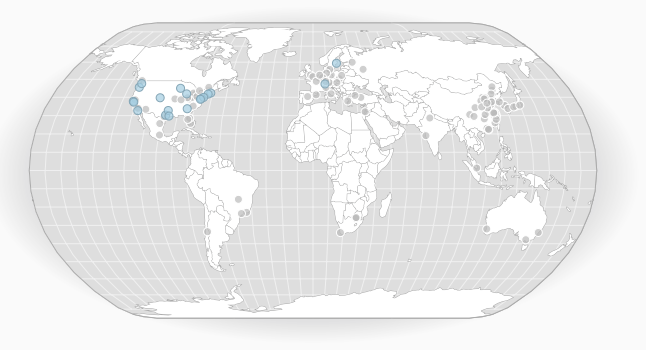Houston identifies itself as an international city. And in many ways it is. When a team of 30 elected officials, business representatives and civic leaders visited Cuba in September it was, in part, to further the city's role as an international player.
"We want Cuba to think of Houston as its preferred partner and gateway to America," said Greater Houston Partnership President & CEO Bob Harvey in a statement.
But how does it stack up against other global cities? According to a new analysis of major metropolises put together by the Brookings Institution's Metropolitan Policy Program, Houston ranks alongside cities like Atlanta, Chicago and Dallas as "knowledge capitals." But it's not quite a "global giant" yet.
Knowledge capitals, reads the report authored by Jesus Leal Trujillo and Joseph Parilla, are "highly productive innovation centers," with "talented workforces and elite research universities. These regions are at the world’s innovation frontier, and thus challenged constantly to generate new knowledge and ideas to sustain growth."
The list categorizes cities across the world into seven distinct categories including: global giants, emerging gateways, American middleweights, international middleweights, Asian anchors and factory cities in China, in addition to the handful of cities like Houston that are defined as knowledge capitals. Meant to provide greater nuance to our understanding of cities, the list aims to categorize cities based on factors like trade, connectivity, innovation and human capital.
The categories come with rankings, too. For cities like Houston, being a knowledge capital means it has high scores on factors such as patents per capita, the impact of research universities, educational attainment and Internet speeds, as well as a strong overall economic outlook. Other knowledge capitals include Boston, Minneapolis and San Francisco.
Among knowledge capitals, Houston had some of the strongest economic indicators, including its GDP per capita and GDP growth between 2000 and 2015. Its trade, air passenger traffic and research profile also scored well.
Overall, Houston ranked third of the 19 knowledge capitals, behind Chicago and Dallas. Houston actually out-performed Dallas in all but four categories: venture capital per capita, educational attainment, overall metropolitan area population and air passenger traffic.
But there's room to improve. Houston actually ranked lowest of all 19 knowledge capital cities when it comes to educational attainment, and in the bottom three for venture capital investment.
But as Houston continues to grow, these rankings may not hold. Houston is already on track to surpass Chicago's population. And the University of Texas has eyed an expansion in Houston, adding to its university scene. The Texas Medical Center continues to add jobs and boost the city's research potential. And a planned -- if delayed -- new terminal at Bush International Airport promises to bring more air traffic to the region.
So what separates Houston, a knowledge capital, from a "global giant" like Los Angeles, New York, London, or Paris?
Size, for one. Los Angeles' population and air passenger traffic, for example, are both well above that of Houston. L.A's overall GDP is larger too (though Houston's is bigger on a per capita basis). After that, the big differences between the two were in Internet speed, venture capital per capita and university research impact, all of which are stronger in Los Angeles than in Houston, according to Brookings.





